I was invited to include an unprecedented guest column in my church’s newsletter on this issue and am attaching here:
Dear Friends,
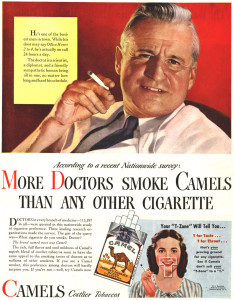 Do you remember the 1990s? In the 1990s, Massachusetts and other states successfully sued the tobacco industry for deceptive practices, including misrepresenting the harmful nature of tobacco products, intentionally attracting children to tobacco products, and targeting African-Americans. Those practices were wrong back then, and they still are today.
Do you remember the 1990s? In the 1990s, Massachusetts and other states successfully sued the tobacco industry for deceptive practices, including misrepresenting the harmful nature of tobacco products, intentionally attracting children to tobacco products, and targeting African-Americans. Those practices were wrong back then, and they still are today.
Now this fall we are faced with a statewide push to legalize THC, the active compound of marijuana, in ballot Question 4 – but the deception and hunger for profits remains. As someone who has always prioritized the health of children and families in our community – I am a father of three school-aged kids – I am troubled at what I have learned about Question 4 and its implications. The profiteering is immoral, dangerous for our children, and makes worse our current public health opioid crisis. So I hope we can learn and pray about this decision, because I consider the hazards serious:
First, Massachusetts has already legalized medical marijuana and decriminalized possession of small quantities. Question 4 is not about medicinal use, but rather the marijuana industry’s push for largely-unrestricted, for-profit commercialization of a drug. Except the drug is not marijuana anymore.
Today’s marijuana is much stronger than a generation ago. In 1989, THC concentration in marijuana was about 2% but by 2008 had increased to 14%. These high levels can be addictive – they elevate the risk of psychosis and addiction for regular users. And the THC is now distilled and concentrated as oils and ingredients, apart from the marijuana plant.
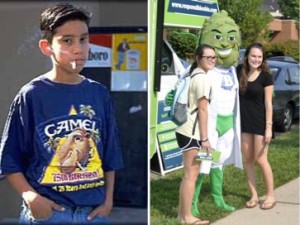 Now voters are being asked to legalize the commercialization and sales of potent THC-infused foods, known as edibles. THC edibles include sweet candies, sodas, cookies, snacks, and other treats like ice cream. Who is habitually attracted to these types of products? Much like with tobacco, it’s children, adolescents, and young adults who would become targets as future and long-term customers.
Now voters are being asked to legalize the commercialization and sales of potent THC-infused foods, known as edibles. THC edibles include sweet candies, sodas, cookies, snacks, and other treats like ice cream. Who is habitually attracted to these types of products? Much like with tobacco, it’s children, adolescents, and young adults who would become targets as future and long-term customers.
The law allows for pot edibles to be marketed and advertised on TV, radio, outdoor billboards, and online.
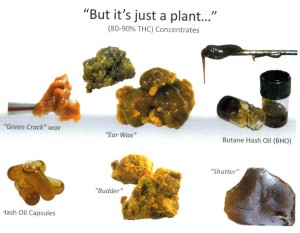 There is no provision to restrict how potent or concentrated the drug would be, even in liquid or candy form. Ingested by adults – let alone young children who are ¼ the body weight of adults – serious illness and hospitalizations result. After legalization in Colorado, marijuana-related ER visits dramatically increased.
There is no provision to restrict how potent or concentrated the drug would be, even in liquid or candy form. Ingested by adults – let alone young children who are ¼ the body weight of adults – serious illness and hospitalizations result. After legalization in Colorado, marijuana-related ER visits dramatically increased.
For children, adolescents, and young adults, studies have shown marijuana to be damaging to brain development, with impairment to memory, motivation, and decision-making.
Drivers of vehicles may also be impaired, although there is no reliable test for intoxication. As a result, the roads will be less safe as marijuana increases the risk of motor vehicle accidents.
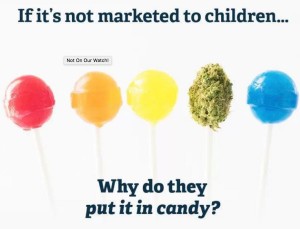 Supervision of under-aged edible use is nearly impossible. Proliferation of edibles masquerading as candy and snacks removes a critical layer of adult oversight because parents, teachers, and law enforcement cannot tell what is food versus what is an illicit and harmful drug.
Supervision of under-aged edible use is nearly impossible. Proliferation of edibles masquerading as candy and snacks removes a critical layer of adult oversight because parents, teachers, and law enforcement cannot tell what is food versus what is an illicit and harmful drug.
The prevalence of “pot shops” in other states seems to follow those of liquor stores, with more locating in lower-income, minority communities, creating additional burdens on the poor.
There may be a responsible way to legalize marijuana, but this is not it. The same moral hazards exist that tested the tobacco companies. And they failed that test. Is there any reason to think that marijuana companies would be different?
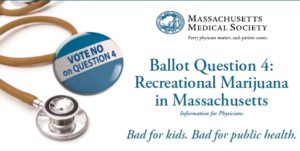 All the district attorneys in Massachusetts are opposed to the bill, as are the Massachusetts Chiefs of Police. The American Academy of Pediatrics, American Medical Association, and Massachusetts Medical Society are opposed. So are most elected officials.
All the district attorneys in Massachusetts are opposed to the bill, as are the Massachusetts Chiefs of Police. The American Academy of Pediatrics, American Medical Association, and Massachusetts Medical Society are opposed. So are most elected officials.
As a church member, I believe we have a role to play to create and protect safe, healthy communities. So I invite you to learn about this initiative and stand on principle against it.
May God’s blessings be with you.
Greg Rolland